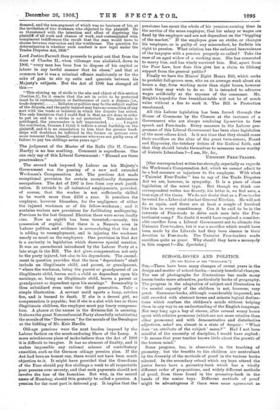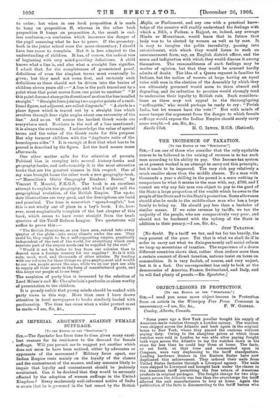SCHOOL-BOOKS AND POLITICS.
[TO TIM tOITOR OF THE SPECTATOR:1
Sin,—There have been many changes of recent years in the design and matter of school-books,—mainly beneficial changes. The use of photographs for illustrations has made many lesson-books more attractive, particularly books of geography. The progress in the adaptation of subject and illustration to the mental capaoity of the children is not, however, very great. Grammar-books, although considerably improved, are still crowded with abstract terms and minute logical distinc- tions which confuse the children's minds without helping them in any way to an understanding of the English language. Not very long ago a boy of eleven, after several weary hours spent with relative pronouns (which are not more relative than other pronouns) and with demonstrative and distributive adjectives, asked me, almost in a state of despair : "What does 'an attribute of the subject' mean ?" Had I not been mindful of the necessity of discipline, I would have replied : "It means that your teacher knows little about the growth of the human mind."
Some progress, too, is observable in the teaohing of geometry; but the benefits to the children are neutralised by the diversity of the methods of proof in the various books selected. In the secondary school which my boys attend the junior forms have a geometry-book which has a wholly different order of propositions, and widely different metluids of proof, from those found in the geometry-book in the hands of the senior boys. Different methods of proof might be advantageous if there were some agreement as to order; but when in one book proposition A is made to hang on proposition B, whereas in the other book proposition B hangs on proposition A, the result is end- less confusion,—a confusion which increases the danger of the pupil assuming what he has to prove. If the geometry- book in the junior school were the more elementary. I should have less cause to complain. But it is less adapted to the understanding of children. It Las, of course, the radical vice of beginning with very mind-puzzling definitions. A child knows what a line is, and also what a straight line signifies. I admit that, for the completeness of geometrical proof, definitions of even the simplest terms must eventually be given; but they need not come first, and certainly such definitions as these should not be driven into the brains of children eleven years old :—" A line is the path traced out by a point when that point moves from one point to another." "If this point does not change its direction of motion the line is called straight." "Straight lines joining two angular points of a recti- lineal figure, not adjacent, are called diagonals." "A circle is a plane figure which is traced out by a straight line which revolves through four right angles about one extremity of the line." And so on. Of course the hardest Greek words are everywhere used. Nowhere is the end of a line mentioned ; it is always the extremity. I acknowledge the value of special terms and the value of the Greek roots for this purpose. Bat why torment children with the "duplicate ratio of the homologous sides" ? It is enough at first that what has to be proved is described by the figure. Let the hard names come afterwards.
One other matter calls for the attention of parents. Political bias is creeping into several history-books and geography-books, and unfortunately it is the most attractive books that are the greatest sinners in this respect. One of my sons brought home the other week a new geography-book, —" Macmillan's Globe Geography Readers: Senior," by Vincent T. Murche, F.R.G.S. The book is an excellent attempt to explain the geography, and what I might call the geographical evolution, of the British Empire. The up-to- date illustrations are very good, and the descriptions are lucid and practical. The tone is somewhat " spread-eaglish," but this is not wholly out of place in a boy's book. I do, how- ever, most emphatically complain of the last chapter of this book, which seems to have come straight from the head- quarters of the Tariff Reform League. Two quotations will suffice to prove this :—
" The British Dominions, as you have seen, extend into every quarter of the globe—into every climate under the sun. They could be, they ought to be, a self-supporting empire, practically independent of the rest of the world, for everything which each separate part of the empire needs can be supplied.by the rest."
"Would it not be better to buy from our colonies than to depend upon a foreign country for our supplies? So is it with corn, meat, wool, and thousands of other articles. By trading with our colonies for these things we give employment and wealth to our own people across the seas, while we on our part are able to supply all their needs in the form of manufactured goods, and this keeps our people at home busy."
The suspicion of party bias is increased by the selection of Lord Miler's and Mr. Chamberlain's portraits as alone worthy of presentation to the children.
It is grossly unfair that young minds should be soaked with party views in this way. More than once I have drawn attention in local newspapers to books similarly loaded with partisanship. The time has come when a wider protest must







































 Previous page
Previous page